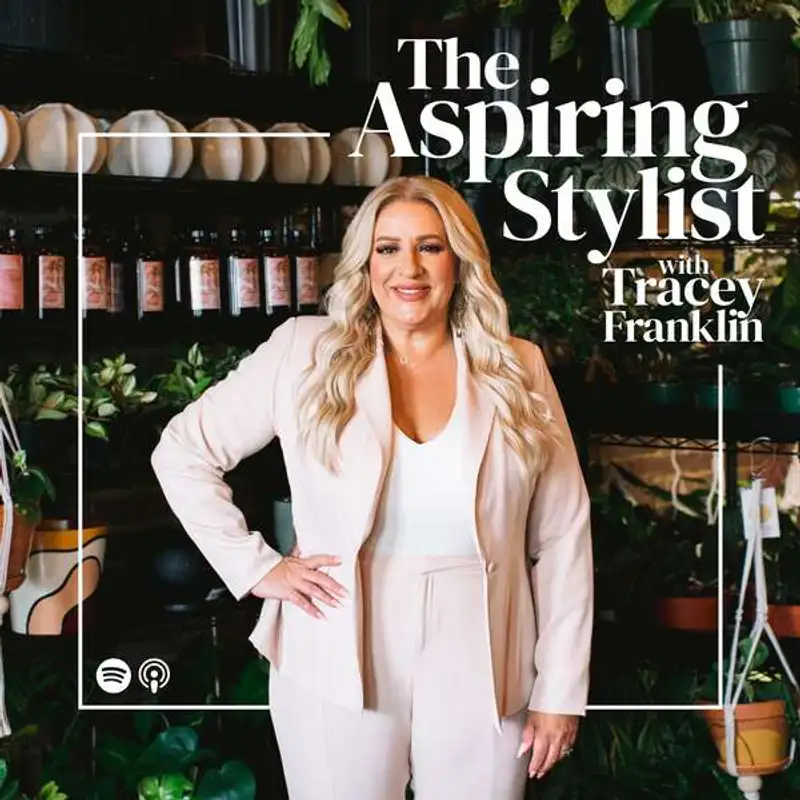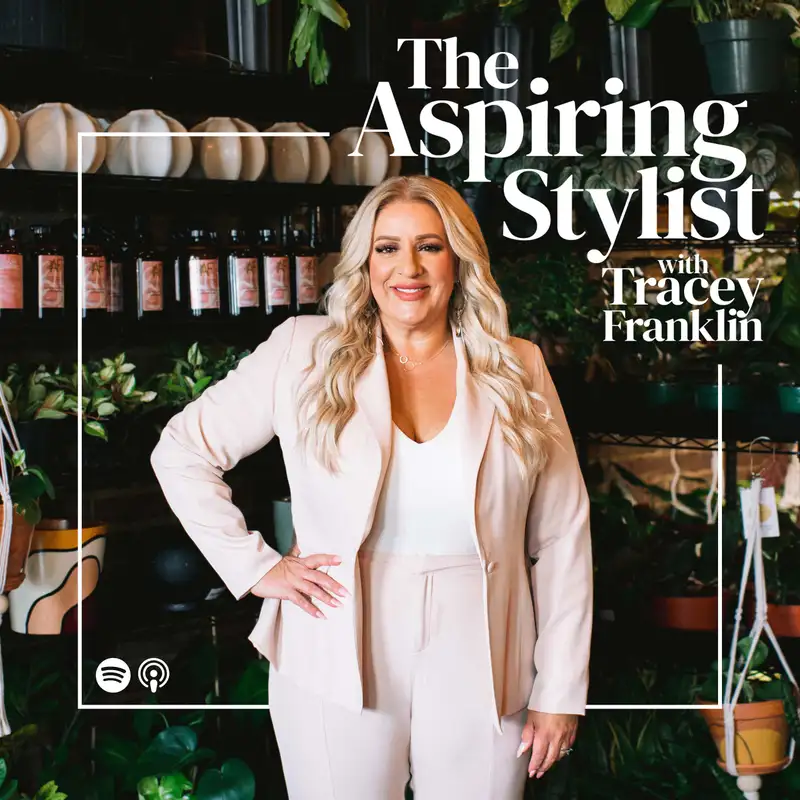Stylists: Enforcing Your No-Show Policy
Morgan Franklin: Welcome to the
Aspiring Stylists Podcast with
Tracey Franklin. Where to begin,
grow and aspire to become the
best stylist you can be. Whether
you're thinking about becoming a
stylist opening a salon, or
developing your skills as an
experienced stylist the next
step of your beauty career
starts here. Each week we'll
discuss strategic ways to
design, plan and execute on
becoming a stylist that excels
behind the chair and above the
bottom line. Here's your host,
Tracey Franklin.
Tracey Franklin: So my salon has
always had a cancellation
policies every since we first
opened. And you know, regulars
are really good about honoring
it. Once you've established that
relationship with your client
and your client learns to value
the salon that they're going to
on a regular basis, they're
usually really good about
honoring a cancellation policy,
new clients not quite as much
it's, I say, oftentimes, like, I
feel like we're seeing this huge
decline and consideration of
stylist in our industry. Like
there's just not the same value
and respect that we used to
receive. I saw a huge decline
after COVID. And I hate to keep
bringing up COVID. But it was
just such a huge transitionary
time. And when we first opened
after being closed, it was like,
everyone was so relieved, they
couldn't wait to get back into
the salon and see their stylists
get their hair done, feel good
about themselves again. And then
that's just started to slowly
trickle away. And to be
perfectly honest, I feel like
it's worse than it's ever been.
So enforcing a cancellation
policy that isn't really clear
is very problematic. And
honestly, it wasn't until we
started collecting credit cards
and really had a process instead
of a policy that we were able to
really make some headway with
it. So most salons require 24 to
48 hours notice for
cancellation, I've seen some do
72 hours, which in my personal
opinion is a bit of a stretch,
like I mean, do you know what
you're doing in three days, I
don't, that to me is probably a
little bit more than I feel
comfortable expecting from my
guests. I do however, understand
the value of having more time to
fill in those gaps. Just not
sure that it's very
accommodating to the guest. Our
current cancellation policy is
24 hours notice, if you cancel
your appointment less than 24
hours of your appointment time
your card on file will be
charged 50% of your schedule
services. Now a no show and a
cancellation are two very
different things. And I'll get
into that in a minute. But a no
show is a complete lack of
respect for my time, and I have
zero chance of filling that
spot. There's nothing that I can
do at 10am when you call at 958.
And let me know you're not
coming or you simply don't show
up at all, and I have no idea
where you are. And time is
money. And now I'm making $0 per
hour. I think that every stylist
or beauty professional should
have a cancellation and no show
policy in place. It is up to us
to bring the awareness to our
clients and our future clients.
Our industry can and should be
held in the same regard as any
other profession. But it's up to
us to make it happen. So what
kind of verbiage should you use
as a stylist for your no show
policy, you should be
professional and you should be
clear, there should be zero
confusion about what your
expectations are. And I like to
use the word policy. So it
doesn't feel like this personal
attack on their character. You
know, an example would be like,
Hey, Susan, I totally understand
that these things happen. It's
just our policy, it's not
personal. So anytime a client
gives us 24 hours notice they
are allowed to reschedule their
appointment without conditions.
However, this is still something
you should be monitoring because
this also can become a problem
if it happens a lot. Again, 24
hours is not a lot of time to
fill a spot, especially if it's
one of those really long
appointments where they're
getting color and extensions and
cuts and other services with
other providers in your salon.
So you need to keep an eye on
that. And even though they're
not technically breaking policy,
it's still a conversation that
should take place if it
continues to happen a lot. When
repeated often money is lost and
you will definitely need to
evaluate other conditions and
other processes needed for that
client. actually enforcing these
policies can be a little bit
tricky. We have a new client
welcome packet that has an
acknowledgement form about our
cancellation policy and we email
this for them to read and sign
before their reservation is even
complete. So if a client calls
the salon collects all the
information books the
appointment and then fails to
return that Acknowledgement Form
back to us the reservation is
not complete and that
appointment is not booked. You
need to make sure your cover
your bases legally. Or you could
be dealing with an angry client
who's disputing charges, causing
problems, leaving negative
reviews on social media and
things like that. So you need to
be very, very clear. And having
something in writing is a great
safety net, I've had problems
trying to enforce my
cancellation policy before, just
like any other salon owner, we
had a really hard time keeping
up with the offenses. When we
first came up with a policy,
this made it really hard to know
when to enforce it and when not
to, we had nothing in writing
and my front desk really wasn't
clear on how to handle things.
And this was my fault. As a
salon owner, the policy wasn't
clear. And we didn't require any
acknowledgement from the guests.
So clients would get really
upset and rightfully so they
were confused, all of us were
confused. So a stylish should be
considering what is actually
lost when they're creating their
cancellation policy, this is
probably going to require a
little bit of math, they should
consider the value of the time
and money lost. When a client
cancels with little to no
notice, decide how much notice
you're gonna require that's
going to be the first step like,
what is your schedule look like?
Typically 24 to 48 hours, but
what's going to work best for
you? Maybe you give them a
chance before enforcing it. I
mean, for us, it's
circumstantial. If a client gets
in a car accident, yes, this has
happened on their way to an
appointment, I'm obviously not
going to charge their card, I'm
gonna be a good human about it.
Another thing is, are you
prepared to store card
information, this is going to
require very specific software
on your computer, your clients
are not going to feel
comfortable about little pieces
of paper floating around the
salon with all their information
on it, are you going to just
take the loss for that
appointment, but then require
them to pay in advance for
future appointments, because
that's something that a lot of
stylists do if they don't have
that particular software, or
they're simply not comfortable
being responsible for that kind
of information. So maybe you're
wondering if you should contact
a lawyer before posting or
beginning to enforce your
cancellation policy? And I think
if you have access to one sure,
I mean, if not, you're good to
use Google to find out what your
state's requirements are. What
if someone does file a credit
chargeback against your
cancellation fee. This is why
it's so important to have your
agreement in writing. Although
it is still not a guarantee that
you'll ever get your money. It
is a legal contract that they've
signed, accepting your
conditions and agreeing to pay
for the services that they don't
show up for that will really
give the client pause. I mean,
they know they signed that. So
are they really going to go
through all the trouble of
calling their credit card
company and going through all
this trouble and definitely
sabotaging their personal
relationship with you. If
they've signed that piece of
paper, I think they're going to
think twice about it, I would
most certainly contact a lawyer
for anything over a couple $100
and at least see what's
possible. We've only had this
happen once and it was before we
created the Acknowledgement
Form, you are gonna get some
pushback from clients on this
cancellation policy. I mean, I
have some understand that this
is how a lot of businesses
operate. But some people are
completely offended when you ask
for their credit card
information, especially if
they've never missed before. So
an example is a faithful client
that's been coming to us for
years cancels less than 24 hours
of her notice. So there's no
consequences for that
cancellation. But in order to
book additional appointments in
the future, a credit card does
have to be kept on file. And
unfortunately, that is just
going to offend some people. And
that is okay. Not everyone has
integrity. And it's important
that people are held accountable
to the agreements that they
make, it does not mean that
they're going to like it, we
have lost clients over it, the
new clients probably weren't
going to stick around anyway, if
you think about it, if they
didn't show up for their first
appointment. That's not a
relationship I want to try to
maintain. But we have had a few
clients that have been coming to
us for years that were appalled
when we enforce this policy and
left because of it. And that is
also okay. Setting clear
boundaries from the beginning is
the best way to avoid any
complications. So what's my
message to stylists about
cancellation policies? Well, in
order for this to become
normalized, we all have to start
doing it. And by it I mean
enforcing something, come up
with something, a policy that
works for you and your business
and enforce it. If we want
people to see us as
professionals, we have to act
like professionals. Do not let
people walk all over you. This
is your career, how you sustain
yourself and possibly your
family. If you don't have a
current policy in place, I urge
you to do so rise with me. Let's
demand the respect that us as
individuals and our industry
deserve.
Morgan Franklin: Thank you for
joining us on this episode of
anytime soon. The Aspiring
Stylist Podcast with Tracey
Franklin. If you enjoyed
listening and you want to hear
more, make sure you subscribe on
Apple Podcast, Spotify or
wherever you find your podcasts.
The Aspiring Stylist Podcast
with Tracey Franklin is a Morgan
Franklin Production. Today's
episode was written and produced
by Morgan Franklin editing and
post-production by Mike
Franklin. Want to find out more
about Tracey and the Aspiring
Barber and Beauty Academy go to
aspirebarberandbeauty.com

